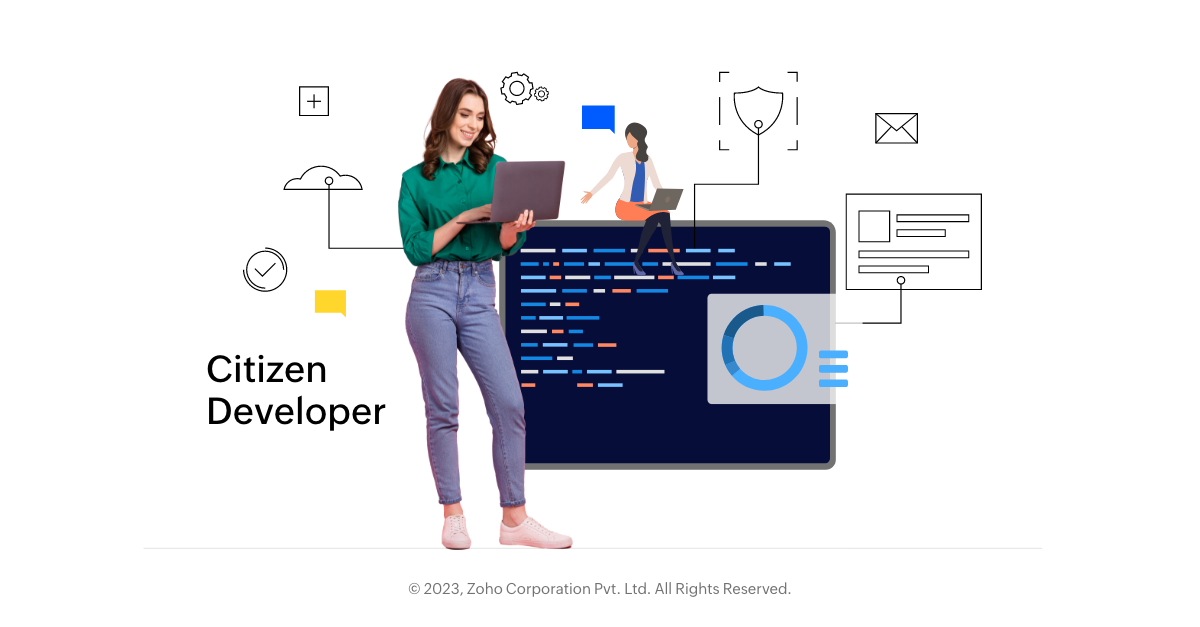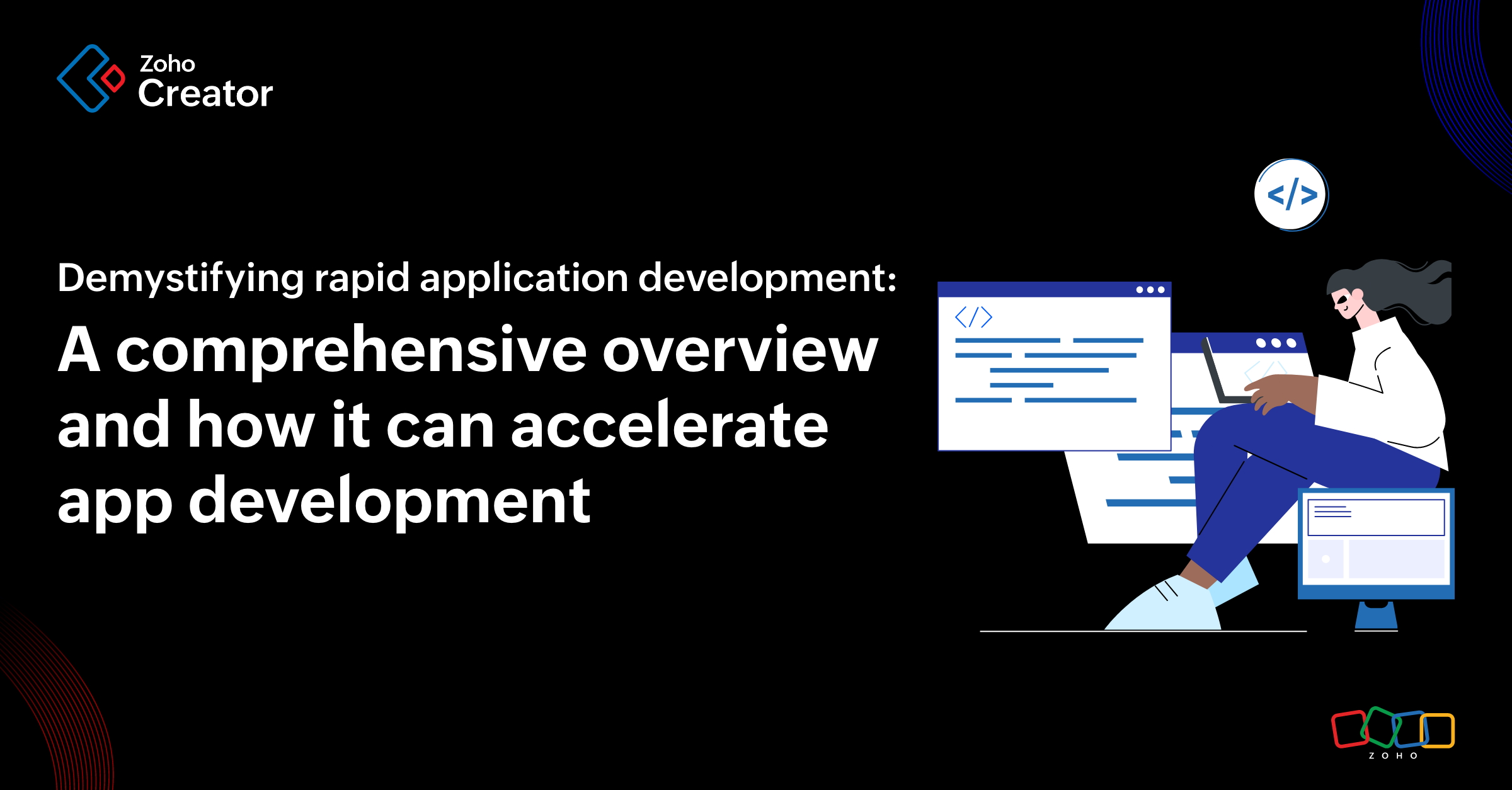- HOME
- Know Your Tech
- How CIOs can leverage citizen developers to accelerate digital transformation
How CIOs can leverage citizen developers to accelerate digital transformation
- Last Updated : October 24, 2023
- 3.2K Views
- 6 Min Read
It's a paradoxical time to be a CIO. On the one hand, digital transformation is all anyone seems to talk about. On the other, few people have a clear strategy about digital technology and how to make it happen—especially at the kind of pace that's needed.
Roadblocks to rapid digital transformation
A recent study by the International Data Corporation says that spending on digital transformation technologies has crossed $1.2 trillion. However, there's a major gap when it comes to skilled developers who can execute on these digital technologies themselves. In fact, we can expect a shortage of 1.4 million software developers by 2021.
The shortage of skilled programmers is only the starting point of the problem. Overworked and understaffed IT departments often get caught up in day-to-day maintenance and cybersecurity concerns, leaving little time for development projects. And the gap between IT staff and business teams often results in inordinate delays in the implementation of critical technology solutions. The result? A major divide between the dream of rapid digital transformation and its execution on the ground.
Where do citizen developers come in?
This scenario has led to the rise of what is now known as “citizen developers.” According to Gartner, citizen developers are non-technical users who create business processes and applications for others by using no-code/low-code development platforms.

These citizen developers are usually business executives who want to find quick solutions to critical business problems. They have access to a visual integrated development environment (IDE) within which they can connect different drag-and-drop application development components to create an entirely new mobile/web application. Gartner predicts that the number of citizen developers will be at least four times the number of professional developers by 2023.
Historically, IT teams in many organizations (especially CIOs) have been wary of citizen developers—and this caution isn't without reason. When cit-dev teams operate without the complete knowledge or backing of the IT team (in the shadows), it poses a huge security risk for the entire company.
On the whole, though, CIOs are coming to realize that the pros of having active citizen developers far outweigh the cons. By implementing no-code/low-code platforms, the number of people who can assist with digital transformation increases. This means businesses no longer have to employ as many expensive developers or depend completely upon an overworked IT team. Low-code platforms are also a great way to involve business teams in development—which means that the final outcome of digital innovations is more likely to be aligned to actual business needs. Then there's speed: according to Forrester, low-code/no-code platforms can make software development 10X faster than traditional programming.

Bridging the gap—how CIOs can leverage citizen developers
Given the situation as it stands today, companies can't afford to ignore or forbid citizen development. A much better approach would be for CIOs to encourage citizen developers and collaboratively build a more efficient operating model together. In fact, in a Gartner survey, 41% of businesses said that they are running active cit-dev initiatives, and another 20% are either evaluating or planning to start one. So how can CIOs work with citizen developers to exponentially increase the pace of digital transformation?
Say no to shadow IT
One of the biggest drawbacks of citizen development is that it's often in the shadows. It starts off when a department feels that it's underserved by IT, and a mid-level manager takes things into their own hands. Most of the time, the IT department is completely unaware of such projects until something goes wrong. If CIOs make it a point to actively cultivate a citizen development program, shadow IT will no longer be a problem.
Build a cit-dev community
Creating a simple, no-frills community for citizen developers can go a long way. It serves as a forum for CIOs, citizen developers, and other users to contribute and discuss ideas. It doesn't have to be fancy—a simple chat channel, weekly meetup, or online meeting works well. It's also a good idea to set up a service desk knowledge base to crowdsource and publish critical information about citizen-developed apps.
Create long-term incentives
The CIO can take things one step further by actually creating incentives that enable a cit-dev culture to thrive. Incentives can come in various shapes or forms — from a simple subscription to tools or a low-code development platform to rewarding citizen developer work through bonuses and performance reviews.
Support cit-devs throughout the process
Here's the basic reason why citizen development often gets tricky—the citizen developer has another day job. So while they may create an app to solve an urgent business problem, they may not always have the bandwidth to maintain the app, or manage the flow of data that's a result of the project. Mentorship, resources and support for these citizen developers is absolutely critical.
Collaborate on change management
As with any major change, one of the biggest issues that you need to manage is the shift in culture and mindset that will come with it. The CIO and citizen developers have to work together to understand exactly how apps using low-code platforms can solve business-critical problems. It's also important that every app comes with its own rigorous workflow—which the citizen developer will have to build. It's just as important to get the IT team onboard by reassuring them that a digital transformation with citizen developers in development won't take anything away from their role and that it won't hamper security and data governance.
Work on security and data governance together
It's imperative the CIO works closely with citizen developers on app security and data governance. An enterprise app store is a step in the right direction, as is security and governance mentoring for citizen developers. It's also important for the CIO and citizen developers to come up with a response plan to security issues for the customers using these apps.
Citizen developers are a great asset to any CIO—they allow business-critical apps to be built in a cheaper, faster, and more effective way, leaving the organization and IT team free to take on more long-term strategic projects. The positives of having a thriving citizen development community far outweighs the potential risks, and it's now up to the CIO to build an ecosystem that really leverages this opportunity.
FAQs on digital transformation
Why does digital transformation matter?
Digital transformation is vital because it enhances efficiency, competitiveness, and customer experience. It empowers data-driven decision-making and fosters innovation, enabling businesses to adapt and thrive in the digital age.
How can I get started on digital transformation or improve my strategy?
To embark on or enhance digital transformation, assess your current state, set clear objectives, create a comprehensive strategy, invest in technology, reskill your workforce, focus on data management, and continually adapt your approach to evolving business needs.
What role can AI play in a digital transformation?
AI accelerates digital transformation by automating tasks, providing data insights, enabling personalization, predicting issues, enhancing customer service, and reducing costs through resource optimization.
How does citizen development benefit digital transformation?
Citizen development expedites innovation, reduces IT backlog, enhances agility, cuts costs, tailors solutions to user needs, and encourages collaboration between IT and business units, making it a valuable asset in digital transformation efforts.
 Tejas Gadhia
Tejas GadhiaTejas is an evangelist at Zoho with his focus set at enabling developers build powerful solutions using Zoho's tech stack.



